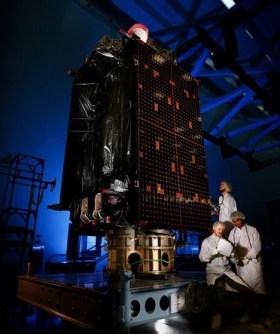
The latest GPS satellite was boosted into orbit from the Cape Canaveral Space Force Station in Florida on Tuesday, Australian time.
GPS III SV07 is now under the control of Lockheed Martin’s Denver Launch & Checkout Operations Center until its official acceptance into the operational GPS 31-satellite constellation.
According to its manufacturer, Lockheed Martin, the (GPS) III satellite, was launched on an “accelerated timeline”.
The time from Space Force call-up to launch for SV07 was reduced to about three months to demonstrate operational agility for launch of critical national security missions.
Prior to launch, the spacecraft had to be transported from Lockheed Martin’s Littleton, Colorado, assembly facility via ground transport to the launch site in Florida, rather than via the usual air transport option. The aircraft that would normally have been used was committed to hurricane tracking and relief efforts.

“Time is of the essence for national security missions, and we quickly delivered this critical capability for the Space Force to support rapid demand for secure, advanced positioning, navigation, and timing signals,” said Malik Musawwir, vice president of Navigation Systems at Lockheed Martin.
All GPS III satellites, including SV07, are equipped with M-code, which is an advanced, new signal designed to improve anti-jamming and anti-spoofing, as well as increase secure access to military GPS signals for US and allied armed forces.
The previous satellite, GPS III SV06, was launched in 2023.






